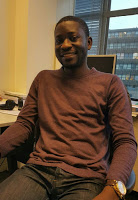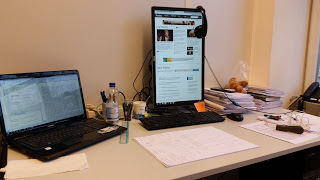I am Adedotun Agbemuko and This is How I Work
 Today, I am interviewing Adedotun Agbemuko for the “How I Work” series. Ade is originally from Nigeria and is currently studying in Delft, The Netherlands
Today, I am interviewing Adedotun Agbemuko for the “How I Work” series. Ade is originally from Nigeria and is currently studying in Delft, The Netherlands
Current Job: MSc Student, Intelligent Electrical Power grids (IEPG) group currently on Thesis work
Current Location: Faculty of EEMCS, Delft University of Technology, Delft, the Netherlands.
Current Mobile Device: Samsung Galaxy S5
Current Computer: Toshiba Satellite
Can you briefly explain your current situation and research to us?
I am currently a second year master’s student at TU Delft, Netherlands. I came over from Nigeria, more than a year ago. Currently, am working on my graduation thesis which is a research on voltage control in high voltage multi-terminal DC grids (HV-MTDC). HV-MTDC is like the newest guy in electric power transmission systems technology. Research into HV-MTDC at this stage is still relatively young, but booming at a startling pace.
Everyone in Europe and the world at large are talking about renewable energies; Europe in particular has a vast amount of wind energy in the North Sea, of which Germany, UK and a host of others have taken steps to start harnessing this source of energy. The huge problem is the distance to shore of sites where the wind energy is enormous. Currently the range of distance stands at between 150-300km from shore and farther distances have been planned for future. For such a region, use of submarine cables is the only viable option to transmit power to shore, and with cables at such distance, the conventional AC grids which we all know and use is not an option for technical and economic reasons; AC cables are best utilized within a distance of 100km, beyond this, power received at other end of the cable is virtually zero. Hence the conversion from AC to DC which is particularly well suited for very long distance applications where AC is not an option.
Current implementations are the so called point-to-point (P2P) connections, that is, between any 2 points. Example is Norway-Netherlands (NorNed) or Britain-Netherlands (BritNed) submarine cable connection and there are 100s of others. As a matter of fact in electrical engineering, we know for sure that P2P connections do not offer security and reliability of supply; hence the need for multi-terminals that can connect at least 3 areas. Such an interconnections technically strengthens the whole system and security is dramatically improved.
What tools, apps and software are essential to your workflow?
S-Planner is very important to me.
My day-day activities are usually a routine that I pretty much have a broad overview of what am going to do. But for other commitments and activities outside of my routine, I put them in the calendar.
I also use ColorNote mostly for as reminder app. I enter a task I want to be reminded of at a particular time, and it does just that. I use it a lot its almost part of my way of life.
I also use the android Email App for syncing my mails from the main servers.
The most important app I use is the ‘Fast Notepad app’. It is similar to the notepad application on computers and is practically my “diary” (sort of); there are times when I get ideas on something I am currently working on while on the move or in a bus or train, the kind of ideas that if you don’t scribble it down somewhere, it may never come to you again. So Fast note also acts as my “scribble pad”. I also have several information that I want to access easily and readily.
I also use dropbox (but I guess everybody use that too), almost every day of the week, and for publishing and report writing, I mostly use Latex.
What does your work space setup look like?
I use a fixed work space provided by my department for students working on graduation thesis. My work space is a little bit of mess right now. But you know as they say, “a clean desk is a sign of a sick dude” (pun intended if you have a clean desk). You can see scrap papers I use to follow equations from research papers. I do that to demonstrate my understanding of the research work; you also can’t 100% rely on these works or assume they are of good qualities, especially the conference papers. Many at times you find inconsistencies with derived equations. You can also find all the papers have read; I know, I should support sustainability and just read from my computer.
 |
| workspace setup |
I spend close to16 hours a day with a computer for which if I have to read from the computer I will have to stare at a screen continuously for 11hours/day for almost 6 days a week. The result of that is a series of nasty headaches at the end of the week; so I just print it out and read directly. Besides, cross referencing is much easier.
What is your best advice for productive academic work?
For productive academic work, I find it important to set realistic targets, short term linked with long term with room for flexibility and changes, with good time management.
Next most important thing is stress management and understanding your body chemistry, working around that chemistry, and stress management. For instance, for me, once I eat lunch, I become lethargic and start dozing off. If I force myself to stay awake, then my brain shuts down, and I become pretty much of a dummy for the rest of a day – I can’t do anything that involves brain power from that point in time; so figure out how your body works and find a way to get around it. Stress management cannot be over emphasized.
Ironically for me, everyone just thinks I do not take breaks. As I have described before, it all comes down to body and brain chemistry. For instance, once I take a 1 week break, it takes me about another week after that to “get up to full speed again” with the work am doing. If I take a month break, it takes about another 3 weeks to get up to full speed again.
Again, I had to figure out a way to get around this which brought me to discover a method I call the ‘hour-glass’ method of stress management. I don’t think I have seen that anywhere (don’t bother ‘googling’ up ;)); this method hardly requires me to take any break and I rarely get tired (except there is time to take a 2 month break 😉 ).
How do you keep an overview of projects and tasks?
I have a pretty regimented way of doing things; for now my activities are very much routine, which means 95% of the tasks daily for the whole work week is known – work on thesis 8 hours/day, 3 hours/day on other tasks such as learning the native language of where I am, a couple of other engagements that also fit into a routine.
For tasks and activities that are not part of my routine, I usually just add them to my calendar with a reminder 2 days before the start of the event. In some cases I also use sticky note pads if it’s a tasks I need to do soon like shopping, booking an appointment with a professor through secretaries, and the likes.
Besides phone and computer, do you use other technological tools in work and daily life?
Phone and computer are about the only tools I use daily.
Which skill makes you stand out as an academic?
Persistence, tenacity, discipline, independence, perseverance.
What do you listen to when you work?
I have found it difficult to work while listening to music or something else, except whatever am working on doesn’t require brain power; if it does, then its absolute silence.
What are you currently reading?
I rarely have time for books outside of academic parlance. But usually in the evenings while having dinner, I read inspirational books, now am reading “How to be Successful Despite Yourself”.
Are you more of an introvert or extrovert? How does this influence your working habits?
I believe am more of an introvert and a little bit of an extrovert (20%); it all comes down to the amount of time I have outside of the work am doing.
I am extraordinarily more productive when am independent and have control over what am doing.
I usually dislike groups (not all the time though), because depending on the kind of group, 70% of the entire time for the tasks is spent on understanding the group dynamics (understanding each other’s view), except the tasks are well defined and I can take on one.
I think for research based work, being an introvert helps, you could sit all day long without the need to talk to anyone; I have being sitting alone for the last 3 days, everyone has gone on holidays and am doing just great!
What’s your sleep and work routine like?
I sleep as much as I work. I typically work for 11 hours a day and sleep for an average of 7-9 hours. From 7am – 6pm am usually on this seat; from 6pm I make dinner or just microwave something I made during the weekend. From 7pm till 8:45pm I try to relax a little to digest some of the food. By 9pm, am already off to sleep. I wake up at 5:45am.
If I don’t sleep between 9-10 pm (mandatory) AND for 7 hours minimum, I can say for sure my day is probably going to be the worst. But every single time I sleep at 9pm for 7-9 hours, I usually have a great day, sometimes I feel so good it’s like you am high.
SLEEP, SLEEP, SLEEP…it helps me a lot and considering if I drink coffee for whatever reasons, I usually have sleep hallucinations, so I never do coffee.
What’s the best advice you ever received?
I’m usually self-motivating, but if I can remember the best advice or advises I ever received (although ironic), “learn to ask for help when you need one”, “keep an open mind”.

Nice one Dr. Ade. Nuggets of wisdom.